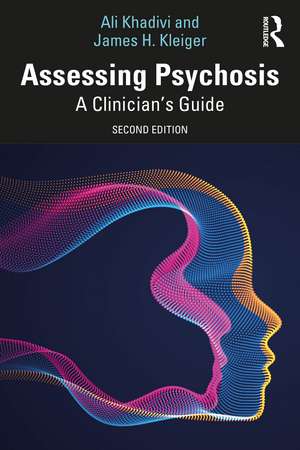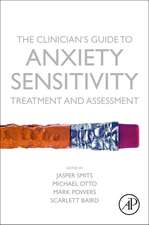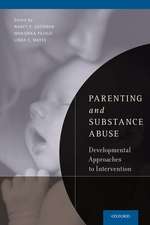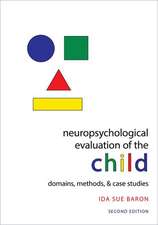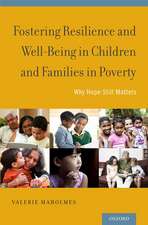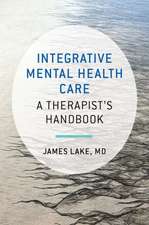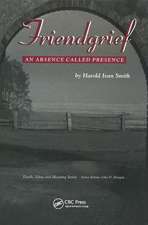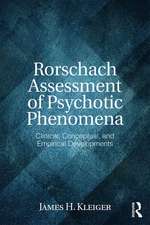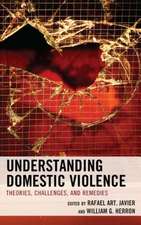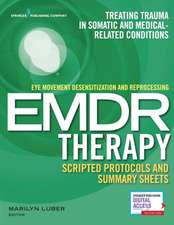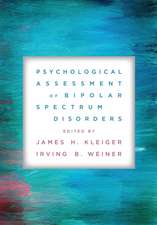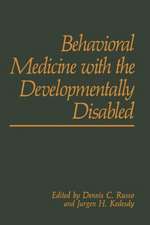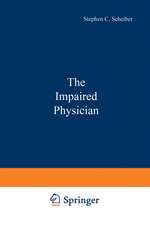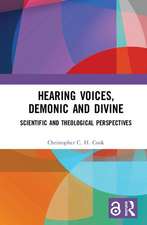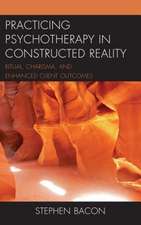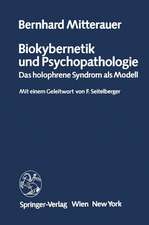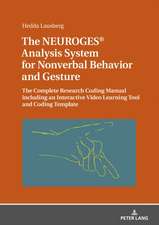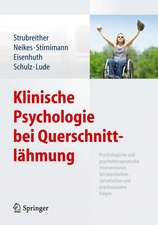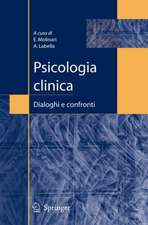Assessing Psychosis: A Clinician's Guide
Autor Ali Khadivi, James H. Kleigeren Limba Engleză Paperback – 9 iul 2024
| Toate formatele și edițiile | Preț | Express |
|---|---|---|
| Paperback (2) | 317.37 lei 22-36 zile | +21.70 lei 5-11 zile |
| Taylor & Francis – 9 iul 2024 | 317.37 lei 22-36 zile | +21.70 lei 5-11 zile |
| Taylor & Francis – 5 mar 2015 | 417.65 lei 22-36 zile | |
| Hardback (2) | 1109.46 lei 43-57 zile | |
| Taylor & Francis – 27 feb 2015 | 1287.77 lei 22-36 zile | |
| Taylor & Francis – 9 iul 2024 | 1109.46 lei 43-57 zile |
Preț: 317.37 lei
Preț vechi: 334.08 lei
-5% Nou
Puncte Express: 476
Preț estimativ în valută:
60.73€ • 63.57$ • 50.55£
60.73€ • 63.57$ • 50.55£
Carte disponibilă
Livrare economică 10-24 martie
Livrare express 21-27 februarie pentru 31.69 lei
Preluare comenzi: 021 569.72.76
Specificații
ISBN-13: 9781032540856
ISBN-10: 1032540850
Pagini: 344
Dimensiuni: 152 x 229 x 21 mm
Greutate: 0.46 kg
Ediția:2
Editura: Taylor & Francis
Colecția Routledge
Locul publicării:Oxford, United Kingdom
ISBN-10: 1032540850
Pagini: 344
Dimensiuni: 152 x 229 x 21 mm
Greutate: 0.46 kg
Ediția:2
Editura: Taylor & Francis
Colecția Routledge
Locul publicării:Oxford, United Kingdom
Public țintă
Postgraduate, Professional, and Professional Practice & DevelopmentCuprins
Part I: Clinical Features of Psychosis 1. Observing and Listening to the Psychotic Experience 2. Understanding Core Psychotic Symptoms 3. Charting the Course of Psychotic Episodes Part II: Diagnostic Concepts 4. Diagnostic Classification: Past and Present 5. Diagnostic Categories or Dimensions 6. Differential Diagnosis of Psychotic Disorders Part III: Assessing Psychosis 7. Assessing Psychotic Dimensions with Clinical Interviewing 8. Assessing Psychotic Dimensions with Psychological Testing 9. Assessing Psychotic Dimensions with Research-Based Instruments Part IV: Special Issues and Population 10. Assessing Psychosis in a Cultural Context 11. Assessing Psychosis Proneness, Prodrome, and High-risk factors 12. Assessing Suicide Risk in Psychosis 13. Assessing Violence Risk in Psychosis 14. Assessing Psychosis in Children and Adolescents 15. Assessing and Differentiating Extreme Pollical Belief from Delusions 16. Assessing Psychosis in a Forensic Mental Health Context 17. Assessing the Diversity of Psychotic Experience: A Recap and Look Ahead
Part I: Clinical Features of Psychosis 1. Observing and Listening to the Psychotic Experience 2.Understanding Core Psychotic Signs and Symptoms 3.Charting the Course of Psychotic Episodes Part II: Diagnostic Concepts 4.Diagnostic Classification: Past and Present 5.Diagnostic Categories or Dimensions 6.Differential Diagnosis of Psychotic Disorders Part III: Assessing Psychosis 7.Assessing Psychotic Dimensions with Clinical Interviewing 8.Assessing Psychotic Dimensions with Psychological Tests 9.Assessing Psychotic Dimensions with Research-Based Instruments Part IV: Special Issues and Population 10.Assessing Psychosis in a Cultural Context 11. Attenuated Psychosis, Psychosis-Proneness & Risk Factors for Psychotic Illness 12. Assessing Psychosis in a Forensic Context 13.Differentiating Delusional Disorder from the Radicalization of Extreme Beliefs 14.Assessing Suicide Risk in Psychosis 15.Assessing Violence Risk in Psychosis 16.Assessing Psychosis in Children and Adolescents
Part I: Clinical Features of Psychosis 1. Observing and Listening to the Psychotic Experience 2.Understanding Core Psychotic Signs and Symptoms 3.Charting the Course of Psychotic Episodes Part II: Diagnostic Concepts 4.Diagnostic Classification: Past and Present 5.Diagnostic Categories or Dimensions 6.Differential Diagnosis of Psychotic Disorders Part III: Assessing Psychosis 7.Assessing Psychotic Dimensions with Clinical Interviewing 8.Assessing Psychotic Dimensions with Psychological Tests 9.Assessing Psychotic Dimensions with Research-Based Instruments Part IV: Special Issues and Population 10.Assessing Psychosis in a Cultural Context 11. Attenuated Psychosis, Psychosis-Proneness & Risk Factors for Psychotic Illness 12. Assessing Psychosis in a Forensic Context 13.Differentiating Delusional Disorder from the Radicalization of Extreme Beliefs 14.Assessing Suicide Risk in Psychosis 15.Assessing Violence Risk in Psychosis 16.Assessing Psychosis in Children and Adolescents
Notă biografică
Ali Khadivi, Ph.D., ABAP, received his Bachelor of Science in Psychology from Tufts University and his Ph.D. in Clinical Psychology from The New School for Social Research. He completed his training at New York Hospital-Cornell Medical Center, Westchester Division, with distinction. He has been practicing clinical and forensic psychology since 1991. Dr. Khadivi is board-certified in assessment psychology and holds the rank of professor of psychiatry and behavioral sciences at Albert Einstein College of Medicine in Bronx, New York. He teaches clinical and forensic psychological assessment at several hospitals and universities and provides training workshops nationally and internationally in the evaluation of major mental illnesses. Dr. Khadivi has been a clinical and forensic consultant for numerous institutions and offers expert testimony in criminal and civil forensic cases.
James H. Kleiger is a native of Colorado and a graduate of Harvard University. He received his doctorate at the University of Denver. Dr. Kleiger completed postdoctoral training at The Menninger Clinic in Topeka, Kansas, and eventually became Training Director of the Postdoctoral Fellowship Program. While at Menninger, he completed his psychoanalytic training at the Topeka Institute for Psychoanalysis and, after moving to Maryland, served as President of the Washington-Baltimore Society for Psychoanalysis. He has authored and edited many books, such as Assessing Psychosis. A Clinician’s Guide, 1st and 2nd Editions, 2015 and 2024 (Routledge, co-authored with Ali Khadivi), and Rorschach Assessment of Psychotic Phenomena, 2017 (Routledge).
James H. Kleiger is a native of Colorado and a graduate of Harvard University. He received his doctorate at the University of Denver. Dr. Kleiger completed postdoctoral training at The Menninger Clinic in Topeka, Kansas, and eventually became Training Director of the Postdoctoral Fellowship Program. While at Menninger, he completed his psychoanalytic training at the Topeka Institute for Psychoanalysis and, after moving to Maryland, served as President of the Washington-Baltimore Society for Psychoanalysis. He has authored and edited many books, such as Assessing Psychosis. A Clinician’s Guide, 1st and 2nd Editions, 2015 and 2024 (Routledge, co-authored with Ali Khadivi), and Rorschach Assessment of Psychotic Phenomena, 2017 (Routledge).
Recenzii
""Assessing Psychosis" is an essential read for clinicians and students alike, offering a comprehensive and nuanced approach to understanding and evaluating psychotic phenomena. This book stands out for its evidence-based guidelines and practical assessment points, making it an invaluable resource in both academic and clinical settings. Rich with case studies and real-world applications, it bridges the gap between theory and practice and is a key asset for advancing your diagnostic precision."
Lindy-Lou Boyette, PhD, Associate Professor of Clinical Psychology, University of Amsterdam and University of Groningen, The Netherlands
"Khadivi and Kleiger have updated their excellent guide written for a wide range of clinicians on assessing psychotic symptoms. Broad in scope, their book emphasizes using interviewing; psychological tests; and rating skills in this assessment. Among its many valuable insights, the book helps us avoid the many false binaries that bedevil our assumptions about psychosis."
Richard M. Waugaman, M.D., Clinical Professor of Psychiatry at Georgetown University School of Medicine, and Training and Supervising Analyst, Emeritus, Washington-Baltimore Psychoanalytic Institute.
“This updated version of a very valuable resource continues to help me conceptualize the complexities of psychosis. The clinical assessment points that encapsulate each chapter are easy to access and beneficial in emphasizing key points. The assessment of suicidal risk in psychosis is particularly relevant to my clinical practice.”
Margaret Bookman, RXN, CNS, APRN, Certified Psychiatric Clinical Nurse Specialist
“This greatly enlarged, indispensable 2nd edition of Assessing Psychosis provides encyclopedic coverage of this pervasive and compelling clinical entity. Comprehensive, lucid treatment of the subject matter covers clinical features, diagnostic concepts, assessment methodologies, special populations (psychosis in children and adolescents), psychosis in culture with ample case material. The revision greatly benefits from new and expanded chapters on differentiating delusions from extreme radicalization, subclinical psychosis in the general population, forensic assessment, and violence and suicide risk in psychosis. The authors show that psychosis is not limited to the clinic, but a pervasive dimension of human existence.”
Marvin W. Acklin, PhD, ABAP, ABPP, ABFP, Department of Psychiatry, University of Hawaii School of Medicine, Honolulu, HI
Lindy-Lou Boyette, PhD, Associate Professor of Clinical Psychology, University of Amsterdam and University of Groningen, The Netherlands
"Khadivi and Kleiger have updated their excellent guide written for a wide range of clinicians on assessing psychotic symptoms. Broad in scope, their book emphasizes using interviewing; psychological tests; and rating skills in this assessment. Among its many valuable insights, the book helps us avoid the many false binaries that bedevil our assumptions about psychosis."
Richard M. Waugaman, M.D., Clinical Professor of Psychiatry at Georgetown University School of Medicine, and Training and Supervising Analyst, Emeritus, Washington-Baltimore Psychoanalytic Institute.
“This updated version of a very valuable resource continues to help me conceptualize the complexities of psychosis. The clinical assessment points that encapsulate each chapter are easy to access and beneficial in emphasizing key points. The assessment of suicidal risk in psychosis is particularly relevant to my clinical practice.”
Margaret Bookman, RXN, CNS, APRN, Certified Psychiatric Clinical Nurse Specialist
“This greatly enlarged, indispensable 2nd edition of Assessing Psychosis provides encyclopedic coverage of this pervasive and compelling clinical entity. Comprehensive, lucid treatment of the subject matter covers clinical features, diagnostic concepts, assessment methodologies, special populations (psychosis in children and adolescents), psychosis in culture with ample case material. The revision greatly benefits from new and expanded chapters on differentiating delusions from extreme radicalization, subclinical psychosis in the general population, forensic assessment, and violence and suicide risk in psychosis. The authors show that psychosis is not limited to the clinic, but a pervasive dimension of human existence.”
Marvin W. Acklin, PhD, ABAP, ABPP, ABFP, Department of Psychiatry, University of Hawaii School of Medicine, Honolulu, HI
Descriere
This second edition of Assessing Psychosis: A Clinician’s Guide offers both a practical guide and rich clinical resource for a broad audience of mental-health practitioners seeking to sharpen their understanding of diagnostic issues, clinical concepts, and assessment methods that aid in detecting the presence of psychotic phenomena.
